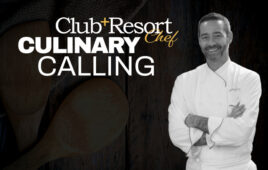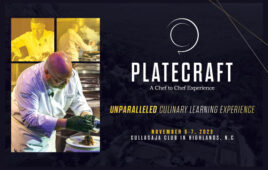Two very different experiences early in his career taught Lawrence McFadden, CMC, GM/COO of the Union Club of Cleveland, that while we may evolve, there is still much to learn.
This sentiment, sometimes attributed to Captain Bligh in Mutiny on the Bounty, is one of my favorites. It genuinely resonates with chefs.
In 1986, while working as an apprentice, a now fellow CMC told me that he just got his butt “lit up” by our Executive Chef. He had such pride in his voice. He was excited that Chef had even noticed him and taken the time to destroy his work and leave him in a heap on the floor behind the line. The crime scene probably didn’t take more than two minutes to unfold, but the impact lasted a lifetime and was retold as a legendary tale over cold beers.
The President of Ritz Carlton used to say, “When I stop yelling at you, I have given up on you.” We knew this quote was more of a metaphor than a directional management principal, but there was still some truth to it.
My culinary background was shaped by Germans who recruited from a development channel from the American Culinary Federation, large hotels, culinary salons, and Olympic Team membership. At the time, Germans owned this corner of the American culinary landscape, while the French gravitated toward free-standing restaurants.
Much like selecting pastry or savory as your professional culinary choice, the nationality of your mentor often shapes your path, simply because you are typically “handed down” to their friends or colleagues. This keeps the pipeline richly populated with new chefs who have a sameness in theory and approach. A chef is certainly not going to lend a friend an outspoken, challenging personality he couldn’t influence or “yell at.” Accepting the gifted individual, the receiving chef knew that new hire had been “broken in” or “emotionally mentored.”
This leadership style worked for me. I appreciated understanding the expectation of the next establishment or chef ahead of time and I began to develop my own style. The kitchen is a collection of passion and oppression. Chefs sometimes get away with less progressive methods of communication under the facade of passion, craft, and artistry. I was one of those chefs until two experiences brought progress to my culinary approach.
In 2003, while cooking a Master Chef dinner, a conversation arose about the new generation of softer, less dedicated or team-centric cooks in the workforce. The comments included the following phrases: lazy, unwilling to put in the time and reluctant to take the beating.
Finding myself in the middle of this conversation, I was asked if I had staffing issues of this sort at the Ritz. I knew it was not what the others wanted to hear, but I answered honestly: “No, we do not have staffing issues with generation X, Y or Q in our kitchen.”
On my flight home the next morning I realized I had wanted to agree, but I knew that times had changed, and most importantly, my current employer expected more from me and the people I worked with.
The second experience came the same year, while I was working at the corporate office of my then employer. I was the corporate chef for the very company that celebrated the passionate tone and German-mentored skills with which I was trained.
The work environment was quiet, calm, and professional. It was like a think tank of the best in class. I understood that the requirements and approach to the job were different than anywhere I had been before. This was now a professional workspace, and I was surrounded by a very educated collection of professionals.
During my first month, while in a high-level discussion, I dropped the F-bomb with pride when referring to “my” kitchen. As quickly as the word left my mouth, I realized the inappropriateness of my comment through the eyes of my Ivy League-educated colleagues around the table. That single word, my favorite at the time, which sparked passion, meaning and direction in a fiery, loud kitchen now sounded guttural, weak and pointless.
Years later, both experiences still ring in my head. One showed me that I had changed and evolved from my mentors’ style when I became an Executive Chef. The second showed that additional growth would always be necessary for me to reach my potential.
Ask yourself if the title of this article rings true in your professional world. Is it holding you back or advancing your ideas in today’s generation of working minds? If the answer is no, then change the approach for better results.





Chef you are so rite. The style I was trained was from a French chef. Pans would fly and f bombs would also be the center of attention. When I became and executive chef I wanted a team that respected the cuisine, each other, and constant change. To be a professional example in all phases in the kitchen, able to do everyone’s job
And give a compliment here and there. Now I am an instructor for high school students and am able to give back without all the stress related craziness.
Excellent read on an excellent subject. I have known Lawrence for quite some time and I didn’t know He was such yarn (story) weaver. With that writing style we could see the next kitchen confidential on bookshelves soon.
RS